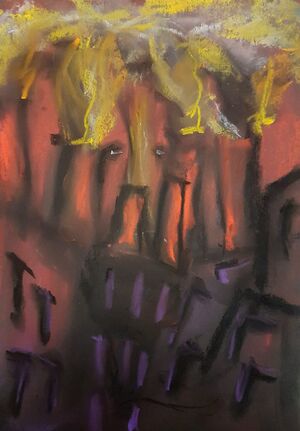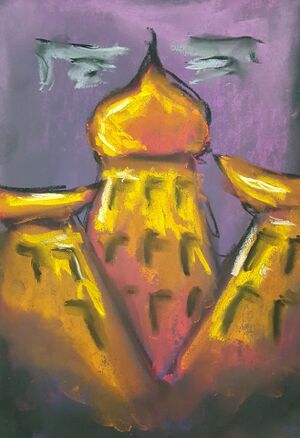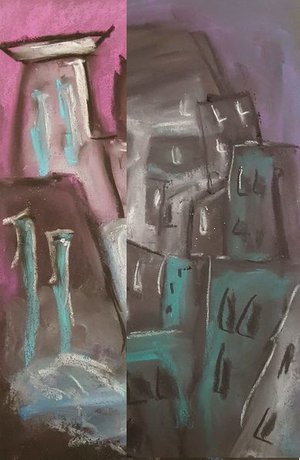Cities of the Iron Labyrinth
Portia stared at the prattling herald as it babbled on in a vain attempt to haggle with the architect. Thekla had been plain about the price and was not budging from it, but if the herald was disconcerted by her spire mate's stoic demeanour, it showed no sign of it. The banal patter, so reminiscent of a Sarvos street urchin continued apace, as the creature progressed to making preposterous claims about being hard up, despite the heavy pouch of money clearly visible on the table next to the box.
"Is this what you expected?" she whispered to Doukas who was stood next to her watching the exchange. She'd heard of the changes that the Hidden Prince had made to the ritual, but this was the first time she'd actually seen it in practice. Doukas was the only one with the ritual mastered, so it made sense for him to cast it, but she'd been intrigued at the prospect of actually seeing one of the Merchant Queens' heralds at work.
Her colleague nodded and then leaned in so that he could whisper conspiratorially - "according to Nunas' guide to the inhabitants of the City of Lead and Gold, the herald isn't motivated by profit, so much as the knowledge of what things might be worth. By his logic, it's the creature's nature that compels it to engage in this ridiculous back and forth. It's almost like an ushabti swinging an axe. It's essentially mindless."
"Ah - if only you had placed that in the box, then we might have secured a much higher price." The herald was gesticulating at Thekla's sigil, as if trying to suggest that the architect might somehow add it to the offer. Or more precisely, the fact that as the laws of magic now constrained her from adding her sigil, that meant that she should accept a lower price. It was a preposterous charade, not least because the sigil had never been on offer at any point.
Portia stared at the herald and tried to imagine it, not as a living creature, but as a thing of metal, of bronze plates and brass cogs. A machine of magic whose wheels turned inexorably according to the whim of some distant creator. It didn't look like an ushabti, but appearances could be deceptive. One of the eternals' names was the Invisible Hand - could there be an unseen hand working this thing even now, like a puppet on strings?
Thekla finally consented and dropped the price by a crown. Seconds later the deal was done, and the herald counted out exactly the agreed money from the purse and then swept the jade into the now empty leather bag. There was a final stream of gratuitous banter as it thanked Thekla for the exchange and for the opportunity to visit such an attractive spire and then it was gone, disappearing back the way it had come towards the spire's regio.
As soon as it was out of sight, she moved over to congratulate the architect. "Did we really just get a shade under two thrones for that Tempest Jade?" she asked.
Thekla nodded, her lips pursed in quandary. It was significantly more than they had been expecting, definitely more than they had received last time they'd employed the ritual. "It would appear that Tempest Jade is in great demand in the City of Gold and Lead right now."
Overview
Confusingly, older documents that pre-date the Way sometimes refer to the Autumn Realm as the Labyrinth. It is sometimes characterised as having aspects of an incomprehensively vast, sprawling maze of immense mountain-high walls dotted with the cities where the eternals dwell. Since the Revelation, writers tend to refer to it as the Iron Labyrinth to avoid confusion; there is nothing to suggest this realm of deals, bonds, schemes, and careful manoeuvring has anything to do with the spiritual realm that theologians say await human souls after death. Still, there is perhaps some poetical comparison. The Autumn Realm is a place of tests and challenges, just as many priests believe the Labyrinth to be.
Of all the eternals, those of Autumn seem to engage most often in what mortal magicians would recognise as "politics". The cities sometimes ally with one another, sometimes they are bitter rivals. Everything shifts and changes, usually in subtle ways occasionally with a single great upheaval. Recent events in the City of Locks seem to mark one such tumultuous upheaval, with the eternal game-board itself being reconfigured as existing powers shift and change. Basileus Flint and Mazen are gone; the Lictors of the Green Iron Citadel have undergone a transformation and are apparently in the process of redefinition.
For most of the other cities, though, it is very much business as usual - and this season at least their business is war.
Towers of Calx and Coom
- Estavus has instructed her heralds to make a number of deals available to (most) Imperial citizens
- Estavus is still irritated with the people of Varushka and they cannot make use of any offers that involve Before the Throne of Estavus
The Archmage of Autumn has requested that Estavus provide aid in the Empire's wars. The City of Shikal has responded by offering opportunities to Imperial magicians. As always, the Forgemistress has a limitless desire for ingots and measures to feed her innumerable forges and workshops. Her emissaries have asked the civil service to distribute information on three offers that may be of interest.
It does appear, however, that Estavus' year-long injunction against the use of her ritual Before the Throne of Estavus by Varushkan magicians still stands. Attempts to use the ritual to benefit from one of these opportunities by a Varushkan will see the mana consumed, but anything targeted by the ritual will be returned instead of being accepted as payment.
As payment for coordinating the (comparatively) complex trades, and for assistance from the Lictors, the heralds of Shikal have also brought messages from the City of Gold and Lead and the Green Iron Citadel.
Mystic Scrolls
- Mystic scrolls for the rituals Ramparts of Ashlar, Hammers of Fury, and Accoutrements of War are available to purchase using Before the Throne of Estavus this summit
- To acquire one of these mystic scrolls requires the ritualist to include a rune of Lann in their container in addition to the ingots
The first request that Edmundo of Damakan's Forge made of the Forgemistress was a chance to once again gain access to the rituals bound in the mystic scrolls. These potent scrolls were last made available to Imperial citizens during the Summer Solstice 384YE, and the scrollwrights of the City of Fire and Stone have been intricately layering gold and obsidian to create more copies. The offer is similar to that made almost two years ago, but there are a few key differences. First of all, due to a spike in demand the price for both rituals on offer has unfortunately increased. The method of claiming a scroll has also changed; they will now be bought directly from the City of Shikal.
A ritualist can purchase one of the scrolls from the Forge-Queen using the ritual Before the Throne of Estavus and including a piece of paper with the rune of Lann in the sealed container. Despite the amounts of material involved, the ritual will work at the normal, base, magnitude (that is, magnitude 4 to send the entire amount in one go, but only for the purpose of purchasing one of the mystic scrolls).
The first ritual is the Accoutrements of War. This ritual calls forth heralds from the Towers of Calx and Coom bearing arms and armour fashioned in the heart of a volcano. These brass armaments gleam with an inner fire and will provide a powerful boost to any military unit that is supporting an Imperial army before they lose their inner fire after a season of campaigning. This temporary bonus increases the effective fighting force of the unit by 100, the equivalent of 5 normal upgrades. If instead, the unit takes the paid work action, they receive twelve random ingots of metal in addition to their normal returns. The ritual is magnitude 20, and it has an assurance - it ceases to function if the Empire ever breaches the terms of a parley with an Autumn eternal. The mystic scroll will be delivered as payment for each Before the Throne of Estavus ritual that contains the rune of Lann and 100 measures of dragonbone.
The second ritual available is the Ramparts of Ashlar. This ritual enchants an existing region containing a fortification. The effective strength of the target fortification is increased by 3000. It is of magnitude 150, and it has an assurance - it ceases to function if a servant of the Empire ever refuses a lawful demand of the Brass Magistrates. One mystic scroll will be delivered as payment for each Before the Throne of Estavus ritual that contains the rune of Lann and 350 ingots of weltsilver.
The third ritual is the Hammers of Fury. This places an enchantment on the forges, foundries and smithies throughout a territory, infusing them with the heat of Shikal's forges so that they can forge the arms and armour needed to equip an army with supernatural speed. This reduces the time needed to muster armies in the territory by one season. Mines throughout the territory also see their production of metals reduced by two ingots, but each gain one pouch of warm ashes in its place. It is of magnitude 80, and it has an assurance - it will only function so long as the Empire possess a working runeforge. The mystic scroll will be delivered as payment for each Before the Throne of Estavus ritual that contains the rune of Lann and 360 ingots of orichalcum.
Mystic Scrolls are somewhat different to the ritual texts familiar to Imperial magicians, in that their power to provide mastery of the ritual they contain is both limited and temporary. A single mystic scroll will allow up to a dozen magicians who study it to master the ritual knowledge it contains before the magic fades. The scrolls lose their enchantment by the end of the summit, so they must be used before then. Obviously, once mastered the magician retains the ritual lore until they lose it in the normal fashion.
These rituals are not part of Imperial lore and there is no practical way for the Conclave to add one, and no way to get them into Urizen lore. It is also not possible to use an arcane projection to share ritual lore - new magicians will only be able to master these rituals as a result of some kind of deal with the Forgemistress. Each of these rituals draws directly on the power of the Prince of Shikal. Should the eternal ever be subject to enmity by the Conclave the rituals would still function, but would be illegal to perform. Each also comes with an assurance - a restriction that Estavus has placed on the ritual. If this restriction is transgressed, the eternal will withdraw her power and the ritual will become useless from that point onwards.
Metal and Stone
- The Conclave can request that Estavus sends representatives from the Architects of Iron and Stone to investigate one or more bourse resources that produces mithril or white granite
- The first such request will cost 150 ingots or measures of resources, the second 200 ingots, the third 250 and so on
- It requires either a Declaration of Concord, or a Declaration of Alignment from the Archmage of Autumn, to explicitly name the resources and accept the service of the Architects
One of the requests Edmundo has made is for the City of Flame and Stone to find ways to protect the sources of Imperial bourse materials. After due consideration, the eternal makes a proposal: the Conclave can specifically ask that the Shikal dispatch some of the Architects of Iron and Stone – a house of the city of equivalent standing to the House of Fire and Flame – to assess one or more of the mithril or white granite Bourse seats over the coming season. All the requests would need either a single Declaration of Concord, or a single Declaration of Alignment made by the Archmage of Autumn. The declaration would need to formally accept the services of the Architects of Iron and Stone, reiterate the Conclave's interest in maintaining their current state of trade and mutual respect, and name the Bourse resources the Conclave wishes the Architects to study. They will only assess seats that produce mithril or white granite - they have nothing to offer as regards weirwood or ilium.
This service obviously comes at a price however. The architects require 150 ingots or measures of precious materials for the first resource, an additional 200 for the second, a further 250 for the third and so. These costs are cumulative, so if the Conclave names four bourse resources, they would need to supply 900 measures in total. If the Conclave wishes to avail itself of this offer, the grandmasters must provide the materials to the civil servants of the Conclave at the end of the second Conclave session so that they can arrange for the payments to be delivered to the Bronze Artisan's heralds.
Each resource that is named and paid for will be visited by representatives of the Architects of Iron and Stone during the coming months. They will prepare a proposal for how it might be defended; along with ways to improve output. After all defence against losing money is still defence.
Recognition of Technique
| Item | Cost |
|---|---|
| Abraxus Stone | 28 Beggar's Lye |
| Ashen Mantle | 26 Iridescent Gloaming |
| Blacksmith's Wage | 12 Orichalcum |
| Cerulean Protector | 9 Ambergelt |
| Knightly Redoubt | 14 Orichalcum |
| Roaring Chimera Rod | 15 Iridescent Gloaming |
| Suzerain's Command | 20 Ambergelt |
| Sydanjaa's Call | 18 Tempest Jade |
| Vambraces of Regeneration | 21 Orichalcum |
| Winter's Breath | 10 Ambergelt |
- A herald of Estavus offers magical items for purchase by Imperial magicians at the Spring Equinox
- Imperial magicians can purchase these items by performing the ritual Before the Throne of Estavus
- The exchange can only be performed at the Anvil regio
- There are only ten of each item available, once they are gone, warm ashes will be supplied in their place
A herald of Estavus, Illia, Master of the Thousand Hammers, has once again come into a large number of magical items of the kind that are relatively common throughout the Empire. The Bronze Artisan has instructed their herald to dispose of these items quickly, eager to obtain more ingots and measures to feed the ever-hungry forges of the City of Stone and Fire.
To enable the trade Illia has once again made arrangements to allow Imperial magicians to purchase the excess stock by casting the ritual Before the Throne of Estavus. To request a purchase, the magician must include a note that lists all the items they wish to buy and enough materials to pay for them all. Illia has provided the Civil Service with a list of prices for her wares.
The magnitude of the ritual will depend how many measures are necessary to pay for the goods. The ritual can affect up to five ingots. Each additional five ingots included in the ritual increases the magnitude by two. For example, if a ritualist wishes to purchase a Cerulean Protector and a Roaring Chimera Rod then they would need to send 15 iridescent gloaming and 9 ambergelt to pay for the purchase - so the ritual would need to be magnitude 12 to transport that many resources to Estavus.
The ritual exchange can only be carried out if the ritual is performed at the Anvil regio. Illia will have workers near the regio to provide the purchased goods - attempting to purchase crafted items by casting the ritual elsewhere will fail. OOC Note: Please ensure you have suitable phys-reps on hand when casting the ritual, so that the ref can ribbon them for you.
Illia only has limited quantities to offer; once they're gone they're gone. From that point on, any requests for an item that is out of stock will result in the materials being returned unless the casters specifically request that spare materials be exchanged for warm ashes (one pouch for each five full ingots or measures sent to Estavus). Any excess measure will be returned to the caster.
Reveal the Knowledge
- The ritual Hand of the Maker is potentially cheaper and easier to perform this summit
- If the ritualist uses a pouch of warm ashes at the Imperial regio then the magnitude is lowered to six
One last boon from the Mistress of the Hammer is offered unasked for and freely. Any performance of Hand of the Maker at the Imperial regio that is performed using a pawn of warm ashes is magnitude six rather than the normal magnitude eight. This means the entire ritual can be powered with a single pouch of ashes, and is easier for a single magician to perform.
If the ritual is performed using mana crystals, or is cast elsewhere, then it is still of the eighth magnitude. It is still possible to increase the magnitude - if dealing with an item that is shrouded in some way - but a standard performance of the ritual will only be magnitude six and require only a single pouch of Autumn vis.
Rates and Returns (Ephisis)
- Supply and demand for certain materials is currently volatile, those using Ephisis' Scales could take advantage of this situation
- There is a glut of mana crystals and mithril in the City that they are keen to offload
- Supplies of beggar's lye and tempest jade have suffered resulting in keener than usual prices being offered by the City
- The potential agreement between the Grendel and the Empire brokered by the City of Gold and Lead is no longer available
Twenty days before the Spring Equinox a representative of the High Merchant appears at the Imperial regio; the well-dressed chamberlain is here to ensure that those who are planning to engage in trade with the Prince of Scales at the upcoming summit have all relevant information. Their visit is short, they find enough citizens willing to spread the information that the Lady of the Counting House has sent and then depart.
Due to an ongoing situation with the beggarwood forests of Lantir and a recent spate of sickness in the workers that harvest tempest jade from the Three Peaks of Goramanth, prices of beggar's lye and tempest jade in the City of Gold and Lead have increased. Contrarywise, there has been a large quantity of mana crystals sold to the City by the warlocks of the Frozen North and a broker working with the Lord of Menast Hall was able to take delivery of an unusually large shipment of mithril which they are now seeking to offload.
The herald advises that these fluctuations are likely to be volatile, anyone wishing to take advantage would need to do so at this summit.
Finally, the chamberlain would like it to be known that the deal brokered by the Invisible Hand last season between the Empire and the Grendel is no longer available. The moment has, sadly, passed.
Cities of Lock and Bond (Lictors)
- An agent of the Brass magistrates will journey to Anvil to meet with a representative of Ashborn Trosk
- They plan on arriving in the Hall of Worlds at 20:00 on Friday
- The City of Locks remains in turmoil
As mentioned briefly last season, the Lictors have finished - or, mostly finished - dealing with the fallout of what transpired between Cracked Mask and the Patron of Spies and Traitors. This means that the Brass Magistrates can finally move forward with the second section of their contract; they will be sending an agent of theirs, Oathsmith, to meet with the representative of Ashborn Trosk to present them with the options they have made available in response to the orc's request regarding the Autumn Hammers.
In an attempt to ensure that the representative of Ashborn Trosk is forewarned of some of the details that will be discussed at the meeting Oathsmith confirms the details of one of the boons on offer. Agreeing to accept the "Boon of Destruction" would see the army equipped with the finest siege weapons drawn from the realm of Autumn, though the army would suffer if the Forgemistress were to ever be placed under the enmity of the Conclave.
Emissaries of the Binders continue to look quite different to the common description of Lictors. One League reckoner described them as "smart" - soberly dressed, with discreet chains and decorated talons. No longer the barely communicative, inhuman agents of unyielding law (for a given value), they appear comparatively amiable and even capable of dry humour. They are guarded in their response to questions, but allow that there has been a fundamental shift in the Green Iron Prison. It seems they may be becoming as interested in upholding laws, bargains, and agreements as they once were in punishing those who transgressed them. What this means for the Autumn Realm, and the Empire, remains to be seen.
The City of Locks, by all accounts, remains in turmoil. Basileus Flint is gone, but there is no indication that anyone else has achieved dominance in the city of the Lord of Treachery. It is, according to one herald of Ephisis, "quite grim".



